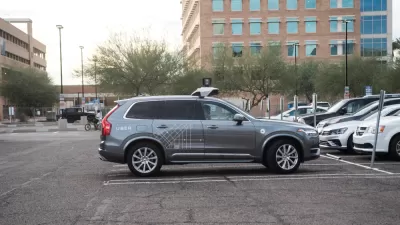Gabe Klein thinks a proposed ban on self-driving cars in Chicago is shortsighted.

John Greenfield recently interviewed Gabe Klein, former transportation chief of the city of Chicago and author of Start-Up City, on the subject of a proposal in Chicago to ban self-driving cars.
Meg Graham reported on the proposed ban in September, in case you missed that story. "Aldermen Ed Burke and Anthony Beale proposed the ordinance Wednesday in a City Council meeting, calling it a 'preemptive strike' after Uber’s announcement it was beginning a pilot of self-driving cars," wrote Graham at the time. The aldermen were unprepared to allow Chicago streets to conduct the "experiment" currently ongoing in Pittsburgh.
Klein's take on the proposed regulation, however, is that the current system of "people-drive cars" is unacceptable. In Klein's own words: "the idea that self-driving cars are going to be less safe is almost impossible. Human error causes 94 percent of car crashes, so the faster we can get people out from behind the wheel of [multi-ton] hunks of metal next to pedestrians and cyclists, the safer our cities will be, the more people will want to live in our cities, the safer and healthier our children will be, because they’ll start walking and biking to school again."
Klein and Greenfield discuss the potential of self-driving cars in much detail—including the role of the taxi industry in opposing self-driving cars in Chicago, the idea that autonomous vehicles will encourage sprawl, and the recently announced federal regulations for self-driving cars.
FULL STORY: Ex-CDOT Chief Klein Discusses Proposed Ban on Self-Driving Cars in Chicago

Alabama: Trump Terminates Settlements for Black Communities Harmed By Raw Sewage
Trump deemed the landmark civil rights agreement “illegal DEI and environmental justice policy.”

Planetizen Federal Action Tracker
A weekly monitor of how Trump’s orders and actions are impacting planners and planning in America.

The 120 Year Old Tiny Home Villages That Sheltered San Francisco’s Earthquake Refugees
More than a century ago, San Francisco mobilized to house thousands of residents displaced by the 1906 earthquake. Could their strategy offer a model for the present?

In Both Crashes and Crime, Public Transportation is Far Safer than Driving
Contrary to popular assumptions, public transportation has far lower crash and crime rates than automobile travel. For safer communities, improve and encourage transit travel.

Report: Zoning Reforms Should Complement Nashville’s Ambitious Transit Plan
Without reform, restrictive zoning codes will limit the impact of the city’s planned transit expansion and could exclude some of the residents who depend on transit the most.

Judge Orders Release of Frozen IRA, IIJA Funding
The decision is a victory for environmental groups who charged that freezing funds for critical infrastructure and disaster response programs caused “real and irreparable harm” to communities.
Urban Design for Planners 1: Software Tools
This six-course series explores essential urban design concepts using open source software and equips planners with the tools they need to participate fully in the urban design process.
Planning for Universal Design
Learn the tools for implementing Universal Design in planning regulations.
Clanton & Associates, Inc.
Jessamine County Fiscal Court
Institute for Housing and Urban Development Studies (IHS)
City of Grandview
Harvard GSD Executive Education
Toledo-Lucas County Plan Commissions
Salt Lake City
NYU Wagner Graduate School of Public Service




























